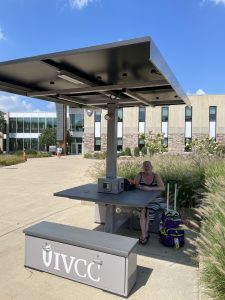Not us vs. them: educators and students need to be a team
March 9, 2017
As a young private music instructor, I try to glean insight from people who have been doing what I do for much longer than I have. One such person who has greatly influenced my teaching philosophy is speaker, conductor, and musician Benjamin Zander.
Zander travels the world, speaking at professional development seminars, and he frequently points out that in the orchestral field, there is an obsession with making more young people like classical music. He calls this a “grim goal.” His solution? “I say everybody likes classical music, they just don’t know it yet!”
Up through high school in particular, it’s rare to hear any one student say that they like every subject they’re being taught. Teachers as a whole are okay with this, knowing that not every student excels in every subject.
However, it has gone beyond this. As a tutor here at IVCC, I work with students who have had teachers write them off, saying to their face that they’re “not good at math” or “just bad at writing.”
Zander’s perspective is an interesting one to bring to this table. Maybe everybody likes math or writing, they just don’t know it yet. I simply don’t believe that people are innately bad at something. Nobody is universally good at everything, but no healthy mind is irrevocably condemned to darkness when it comes to understanding something. If students understand a concept, they are more inclined to like using it; think of the lyrics from Disney’s “Beauty and the Beast”: “we don’t like what we don’t understand, in fact it scares us.”
Building on this thought, Zander teaches educators to ask themselves, “who am I being that my students’ eyes are not shining?” He uses the idea of shining eyes to describe joy in understanding.
Teachers and tutors need to ask themselves what they are doing that is impeding understanding. The answer may be nothing; the student may be willfully refusing to learn, but we need to at least ask. It is humbling, but important. When I’m teaching, as my student is having a hard time, I try to ask them, “what can I do that will help you do what I’m asking of you?” Sometimes their answer reveals something important, and I get the chance to learn, too.
As educators, we may know more than the student we teach, but we need to extend grace and patience to them. We need to use encouragement. Let’s be willing to remind our students that they aren’t bad at anything, just not as good as they could be, and that the nice thing about not being being as good as they can be is that they can get better. Let’s be willing to look into their eyes, take responsibility for what we see there and make them shine.



